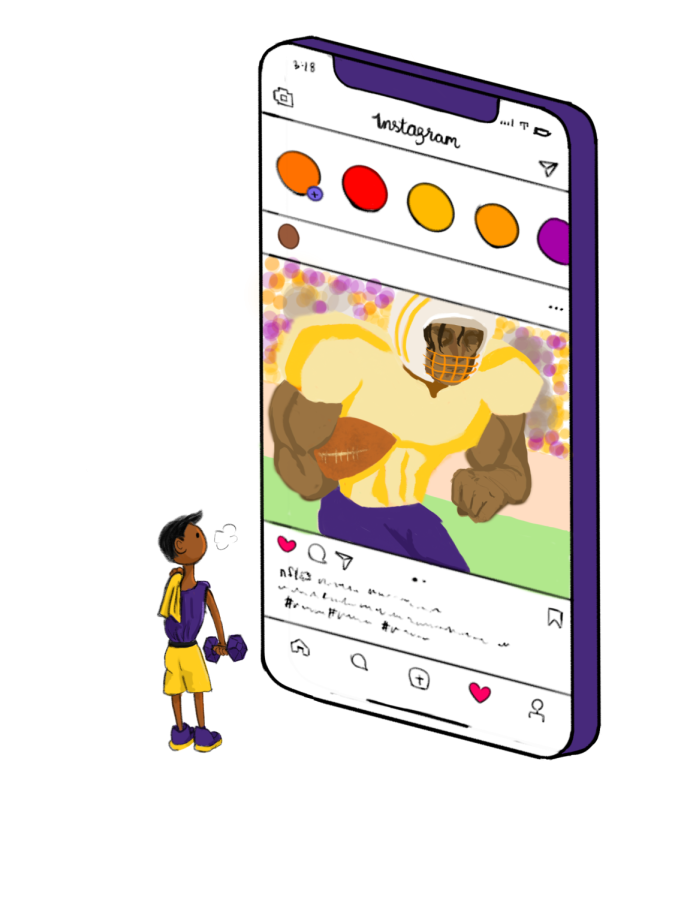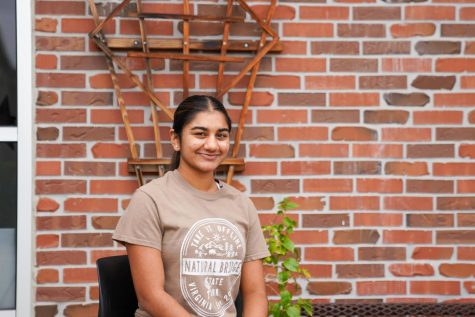Male athletes experience muscle envy
Examining the body insecurities male athletes face
Student football players often feel pressured as they compare their bodies to those in the NFL
March 16, 2022
The thundering sound of feet slamming onto the field filled the air as the athletes on the MVHS football team sprinted across the field for their running drills as part of their daily practice. Senior Ronit Ramachandani, who was a freshman at the time, pushed himself to keep up with the others, panting and sweating. However, he soon found himself falling behind and ending up as the last player to cross the finish line, the upperclassmen long cooled down. After finishing last in numerous other drills over and over, Ramachandani found himself comparing his body to those of the other, faster and fitter members on the team.
“My freshman and sophomore years, I was not really focusing on my diet,” Ramachandani said. “I wouldn’t be in the best shape compared to the others and it made me feel bad about myself.”
According to Sports Connect, sports like football and wrestling often require certain body types, and players frequently find themselves feeling pressured to keep up the body standard prescribed by their respective sport. In the process, athletes like first-year football player and junior Dillon Huang experience distressing feelings and frequently find themselves feeling low.
“I don’t actually go to the weight room,” Huang says. “I feel like I’m being kind of teased for not being strong enough.”
Senior Kaushal Amancherla adds that in the past, comparing himself to other wrestlers who are more muscular than him has negatively affected his image of himself and reduced his confidence before tournaments. Similarly, Ramchandani recalls comparing his body to those of other, more experienced players when he first started playing football. He experienced discomfort in his own body upon seeing others that better fit the typical body standards of his sport — standards that include toned bodies and large muscles.
“Not being able to hit as hard as other people affected me,” Ramachandani said. “I didn’t have enough muscle, and I was always looking and [thinking], ‘I wish I was like that.’ It’s really draining because every day you see these people and see them performing better than you and you want to be them.”
According to Gatorade Sports Science Institute, weight management is exceptionally important to football players. Often, higher body masses correlate to acquiring desired positions on teams, higher playtime and higher pay in the NFL. These benefits frequently appeal to high school players and push them to pursue the body types of professional players. Mishra explains that linemen and tacklers are generally “larger,” while other positions like the wide receiver require one to be “more agile and fast.”

“It creates a culture like ‘Oh [if] you play at a line … you’re fatter or not as fast [and] skilled,” Mishra said.
“But it takes [an] equal amount of talent to do both.”
Huang emphasizes that nationwide representations of football frequently pressure high schoolers to maintain a certain and unrealistic physical appearance. He adds that the significance of football in American culture only adds to this pressure, and leads to people pursuing impractical appearances.
“People in football want to look like professional NFL football players with big muscles [and look] really fit,” Huang said. “Sometimes people prioritize aesthetics over strength. They want to be the person on the field who looks the most ‘football-like.’”
Ramachandani echoes Huang’s belief that the media’s representation of football players can cause body insecurity for athletes. He says that when he “wasn’t in the best shape,” viewing posts on social media promoting a stereotypical, unattainable body type hindered his confidence.
“[People] show a lot of things on the internet [that] is not reality,” Ramachandani said. “You want to check out your physique when you’re done working out and it affects your mental health. Because looking at other people you’re like, ‘Wow, they look so good. Wow. I want to be like them.’”
Similarly, Mishra adds that a lot of videos on TikTok promote an unrealistic exercise and diet culture, which encourage athletes to strive for idealistic body types.
“Having a really shredded body [is] something that [has been] popularized a lot online,” Mishra said. “But I think it gets a little bit overwhelming at times [when] people will start judging people for it.”
However, both Huang and Ramachandani agree that players can often use these negative, distressing feelings as a form of motivation in order to help them succeed on and off the field. Huang says that he uses his frustration as encouragement at practice to push himself to achieve his desired body type when training. Similarly, Ramachandani has used his feelings of discomfort to push himself to build a type of body that he feels comfortable with, one that can help him achieve on the field.
“I like to work out a lot to improve my body and my confidence. The gym and the sport was a really big part of my life,” Ramachandani said. “In the beginning, it was really frustrating, but getting that motivation and push from teammates … and [talking] to coaches would motivate me overall. It was a good environment.”




















